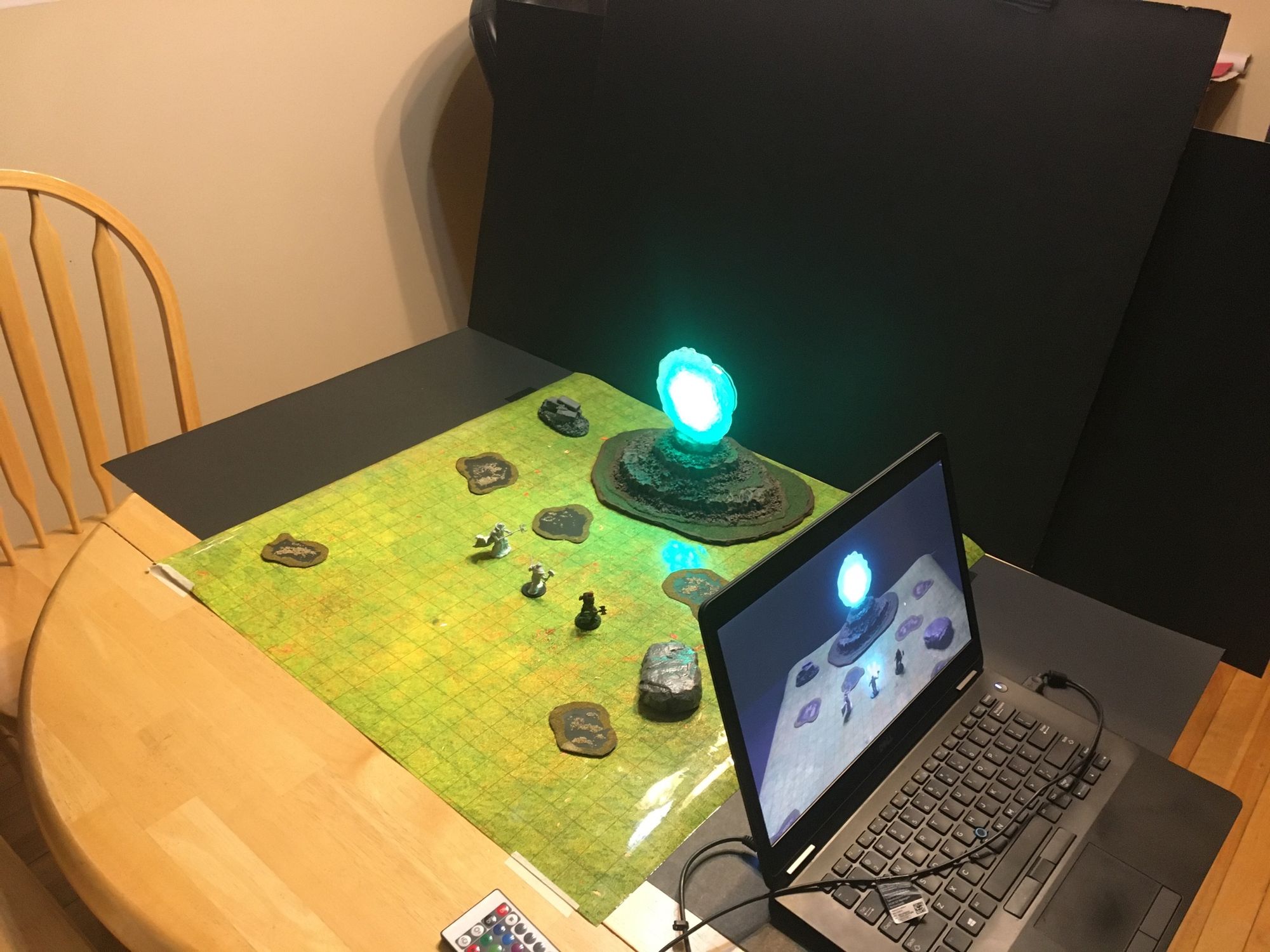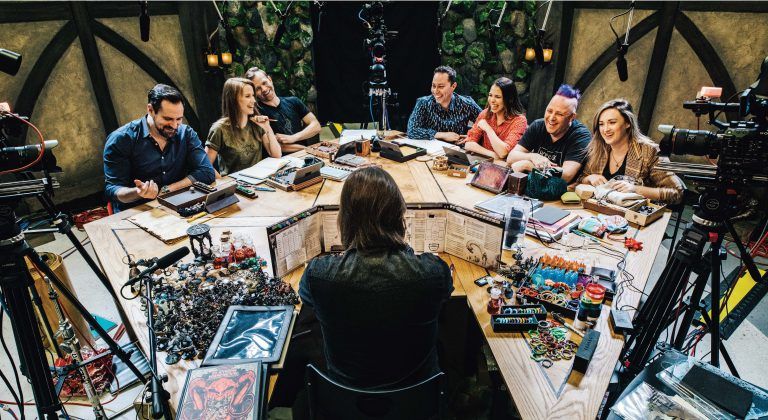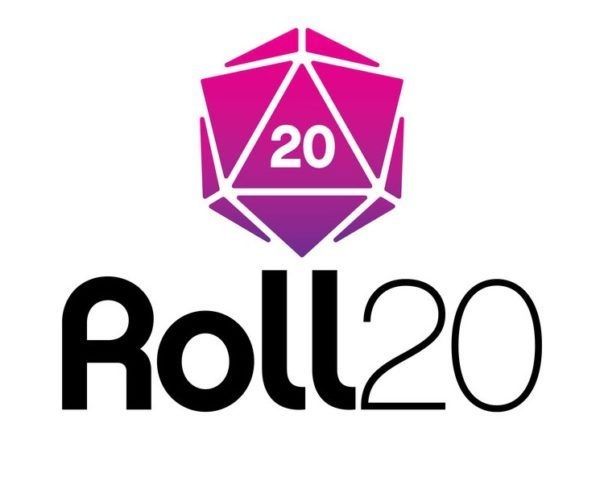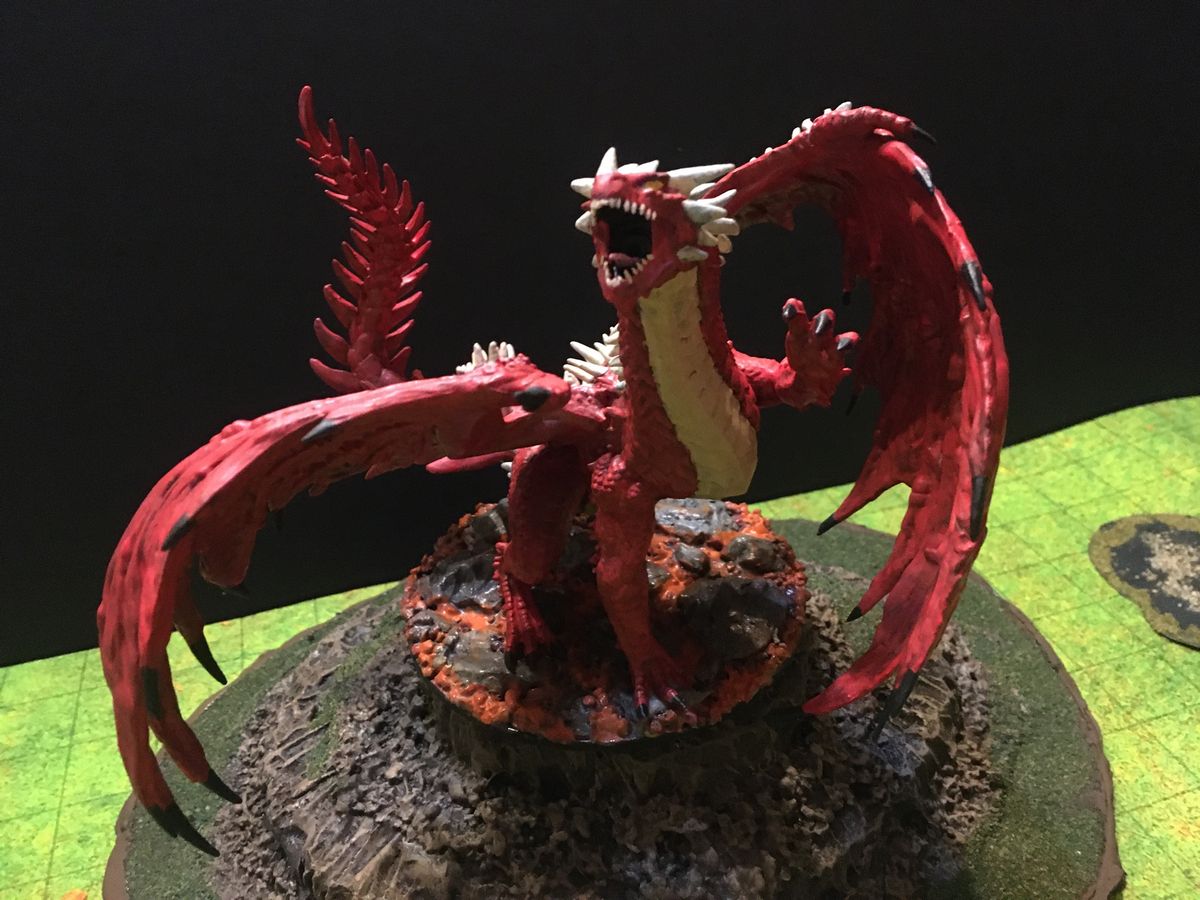Painting the dragon took me about twenty hours, all by itself. Granted, part of that was spent fixing a disastrous first coat, but it was still a chunk of time, by any measure. And that was just the start of my game prep!
After nearly twenty monthly playing sessions, my Dungeons & Dragons campaign was finally nearing its end. My players would face off against a ferocious Ancient Red Dragon, close an interdimensional portal, and save the world! I was going to end things with a bang.
I spared no effort! I painted a second dragon, to be their ally in the fight. I assembled eleven pages of hand-written notes. I even threw together a light-up portal - made from a Pringles lid, hot glue, and powered by a portable LED pool light.
COVID-19 happened instead. The last session of our campaign occurred via video call. I’d be lying if I said I wasn’t disappointed.
It was still fun, and I did still find a way to make use of all the minis and props I’d prepared. Even so, it was different, and it’s remained different in the months since this all began. It hasn’t been that way for just me alone.

Making the Best of a Global Existential Crisis
The tabletop role-playing game hobby started back in 1974 with the original release of Dungeons & Dragons. While there’s been a range of different editions since the original, and countless other games of all sorts since then, the basic core of the TTRPG experience has stayed the same.
While many people have a mental image of weird dice and thick books emblazoned with fantasy creatures, the most essential ingredient of a good tabletop game are people to play with. The hobby is driven by people coming together to create shared experiences.
You can understand how a global pandemic where “social distancing” became the norm might flip that on its head.
The lockdowns and quarantines necessitated by COVID-19 brought countless games and campaigns to a halt. Even Critical Role, the long-running and popular live-play show, recently turned Amazon animated series, went on a temporary hiatus.
Many businesses in the TTRPG space also struggled as longtime sources of income closed down for COVID-19.
“We [could] no longer rely on conventions and in-store sales to be a big portion of our income,” said Gallant Knight Games’ Alan Bahr.
As with almost every facet of life during this time, however, TTRPGs and the players who love them found ways to adapt and even thrive amidst the chaos of the global pandemic. Zoom, Skype, and dedicated RPG platforms like Roll20 became the new gathering place for gamers looking to keep their playgroups alive.
And as the pandemic pressed on? The importance of the hobby in their lives became magnified.
“[Role-playing games] became my coping mechanism and socialization outlet,” said Marshall Lemon, a marketing professional and co-founder of Gorgon Breath Games. “For one brief window in Summer 2020, I was running three campaigns at once!”
For many RPG players, getting together, even just to play for a few hours on a Zoom call, became a treasured break from the endless grinding sameness necessitated by lockdowns and quarantines. For a few hours, you weren’t just another person wondering when this would all be over. You were one member in a company of heroes, working together to save the world.
“[For] a lot of people, what they got out of gaming, was the in-person camaraderie that’s been lost in this time,” explained Sam Kurnit, host of the Improvised Weapons live-play podcast.
This element of the experience didn’t just appeal to long-time players. The hobby has seen countless new people take their first steps into role-playing over the past several years.
For some, it became a way to pass the time and socialize. For others? It became something to keep them going through the hardest time in recent memory.
“I've been [running a game] for my group for over a year now,” said dungeon master Tracy Farrell. “Finding the motivation to do anything other than go through the motions can be excruciating in a COVID-19 world, but when you're the DM, the game doesn't happen without you… I've come to find that there's no greater motivator than hearing someone say, ‘Thank you. This was fun. I can't wait to see what happens next week.’”

Long Term Side Effects
While tabletop RPGs have proven a valuable tool for recreation and distraction, the COVID-19 crisis has also exposed some of the hobby’s longstanding issues.
The pandemic especially turned a spotlight on the importance of digital connections in the TTRPG gaming space, as well as the over-focus it sometimes has on the past.
“I think one problem that the pandemic brought to the forefront, is that a lot of industry hadn’t caught up to the times,” said Doug Shute, a TTRPG marketing professional and the host of Victory Condition Gaming. “It needed to have that wake-up call that we need more digital tools and well-implemented platforms for TTRPGs of all systems if we want to see this hobby grow even further for the next generation.”
While there are still holdouts, the necessities of the pandemic have also softened the attitudes of many traditionalists who have long insisted that in-person was the only “real” way to play.
Platforms like Roll20, designed to facilitate online play, reported that users spent more than 100 million hours with its services in just one quarter of 2020. They also reported significant increases in traffic overall, throughout that year, and in the months since.
“[COVID-19] has made online play more of an acceptable option to players that were not fans of that method of play previously,” Shute continued. “It’s also made a lot of publishers pivot, focus, and commit more resources in creating tools to support that method of play.”
More people trying digital play hasn’t just kept games going. It’s also exposed players to the unique perks of leaving the table behind.
“[There’s] no travel time. [Digital] tokens are cheaper than [physical] miniatures. I pick the snacks and keep them all to myself,” said Marshall Lemon. “The biggest [benefit] is that I can play again with some great friends who moved away. I’ll miss them all over again if I go back to fully in-person.”
Digital play can also make it easier to streamline parts of the game that sometimes make things drag when everything’s handled at the table. It’s not uncommon for some TTRPG game nights to last anywhere from four to six hours, if not longer.
People of all sorts are busier than ever, and that sort of time commitment, especially on a recurring basis, can be a tough pill to swallow. Even if digital tools are only used as a supplement, they’ve proven handy in helping dungeon masters get more out of shorter play sessions.
“Since COVID means we’re playing online anyway, I try to keep most of the downtime activity out-of-game (equipment shopping, checking on NPCs, etc) to chat threads,” said Lemon. “That way, game time can focus on the high-stakes stuff that requires dice rolls.”
Shorter, more compact games are a trend that seems to be taking root among more than just a gaming group here and there. Representatives from Roll20 confirmed that most of their users are playing well under four hours.
“Users on Roll20 tend to play between 90 minutes to 3 hours per session,” said the Roll20 marketing team, responding to questions. “During the early months of COVID, the average session length increased dramatically, and we now see a higher baseline for average session time.”
Outside of Roll20, platforms like D&D Beyond, Foundry VTT, and more are providing further tools for gamers to connect and play outside of traditional “pen and paper” methods. Many in the TTRPG space believe this is just the beginning.

The Next Roll of the Dice
For my personal part, I’m eager to get back to the table, as are a lot of the players and dungeons masters I know and interact with. There’s something about that tactile experience of being in a room with people that I don’t think a digital-only game can replace.
That being said? I don’t know if things will be quite the same when the world finally calms down enough for in-person to become the norm for me again.
Tabletop role-playing games can be a great way to connect with other people. They provide a structure and mechanics that can make it easier for players of all sorts -from exuberant extroverts to the socially awkward- to interact, have fun, and make memories.
If there’s one universal truth about TTRPGs, however, it’s that they fall apart fast. Many games, even long-running campaigns with veteran players, are just a few missed sessions away from crumbling. There’s no denying that digital play has been a lifeline throughout these past years; keeping fragile but treasured friend groups intact.
It would be foolish to not recognize the value of the tools that have been emerging and growing as a result of that. Wherever my games are played in the future, there’s no doubt in my mind that digital tools will have a bigger place at my table. I’m already eyeing the next session on my calendar with plans in mind.
(I do draw the line at digital dice, though. Real dice or nothing. A man does have to have some standards.)

